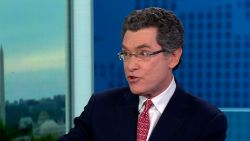Gallup’s new poll on President Donald Trump’s political standing shows two things:
1) His decision to reignite a culture war over calls to remove monuments has rallied his political base behind him.
2) That same decision has further alienated the independents and other swing voters he desperately needs to have a real chance at winning a second term.
On the first point, more than 9 in 10 (91%) Republicans now approve of the job Trump is doing in office. That’s up from 85% who said the same in the last Gallup poll, which was conducted in early June.
Which makes perfect sense! Trump has leaned hard into his base-first strategy over the last month as he looks for a handhold amid a political free fall. He’s talked relentlessly about the lawlessness of the protests in the wake of the death of George Floyd in late May in Minnesota. He’s appealed to a defense of “our heritage.” He’s cast the very fabric of America as tearing – thanks to the assault of a liberal horde intent on destroying everything that made America great. “Our nation is witnessing a merciless campaign to wipe out our history, defame our heroes, erase our values, and indoctrinate our children,” Trump argued in a speech on July 3 at Mount Rushmore.
View 2020 presidential election polling
The problem for Trump, politically speaking, is that every political action – or at least this political action – has an equal and opposite reaction. Which, in this case, is a drop in Trump’s support among independents – and even Democrats.
Trump’s approval number tumbled from 39% (already not good) to 33% among independents in the new Gallup data. And among Democrats, Trump went from 5% approval (bad!) to 2% (really bad!) between the early June poll and the late June one. It’s not a coincidence that Trump’s numbers have worsened among both groups even as he seeks to make the 2020 election a referendum on some sort of culture clash that, aside from his loyal base, he is on the wrong side of.
What Trump is doing at the moment – judging from the Gallup numbers – is running a very effective primary campaign. He is consolidating his base behind him using fear and overt racial appeals. (Trump’s tweets on Monday calling on NASCAR’s Bubba Wallace to apologize are the latest evidence of that purposeful weaponizing of race.)
The problem, of course, is that Trump doesn’t have a primary problem. He has a general election problem. And by running a primary when a general election is what’s called for, Trump is making it harder and harder for himself to ever make the turn to a more traditional general-election strategy of outreach and inclusion.
Why? Why cut off your nose to spite your face? Because Trump can’t help himself. Because he has never had or shown any real ability or willingness to look outside of the base he built in the 2016 election. He won that race because people – including independents and even some Democrats – wanted change so badly that they were willing to take a flier on him. (Trump won independents by 4 points over Hillary Clinton in 2016.)
With 3-plus years of being President on his record, Trump’s ability to make the case that he is still the change agent the country needs – especially when he has shown himself in so many ways over that time to be willing to divide along racial, gender, ethnic and every other line he can think of – is greatly reduced. Anyone who took a few poli-sci classes in college could understand that. But the President seems unable or unwilling to do so.
The simple fact is that Trump’s base, while plenty large to win him a GOP primary (there’s a reason no serious primary threat emerged), isn’t even close to big enough to deliver him a second term. It’s why his approval rating in the new Gallup poll is just 38% – close to the low point (35%) of his presidency. And why past presidents who have had approval ratings similar to where Trump is right now have generally not won second terms.
“The drop in Trump’s job approval rating puts him in the company of George H.W. Bush and Jimmy Carter – the last two one-term presidents, who also had sub-40% approval ratings in June of their reelection year,” wrote Gallup’s Jeffrey M. Jones of the new findings. “Earlier this year, Trump’s approval ratings were closer to those of George W. Bush and Barack Obama at a similar point in their presidencies, the last two presidents who won a second term.”
Simply put: Trump can have a 90% approval rating among Republicans and still lose – potentially in a landslide – on November 3 if his approval among independents (and Democrats) stays where it is. Right now, in fact, that’s the likeliest outcome.



















